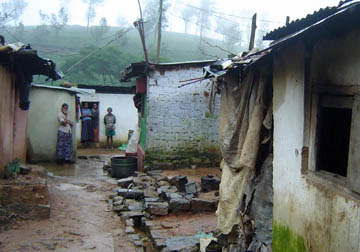Sri Lanka’s school children lead the way on healthier habits
May 7, 2010 07:22 pm
In
Most families depend entirely on their own private wells for water, but since the 2004 tsunami, salinity levels in the ground water increased dramatically and the water is mostly only good for washing.
The water situation in this arid region has always been precarious. Beset by drought for three months of the year, almost half the wells in the area go dry or the water turns brackish. The circumstances in Potuvil worsened after the 2004 tsunami which claimed 577 lives, displaced 7750 families and contaminated hundreds of wells.
Now, life in Potuvil is set to improve dramatically. A recently completed water supply scheme has started to provide piped water directly into peoples homes for the first time as well as to eight schools in the catchment area.
Providing sustainable water supply
“This is one of the biggest infrastructure projects to have been built under our tsunami reconstruction programme’, says Al Panico, head of the International Federation of Red Cross and Red Crescent (IFRC) tsunami unit. “The aim is to work with the government to improve the health of the residents of Potuvil by providing them with a sustainable water supply.”
The IFRC together with support from the American, Swedish and Irish Red Cross societies have funded construction of a 1000 cubic metre water storage tower that has the capacity to provide water to the entire population of Potuvil. The Red Cross is also laying around 40 per cent of the new distribution network, amounting to 33 km of pipeline that will reach some 6,000 households. The pipeline and distribution system is connected to a new water treatment plant funded by USAID.
Improving people’s access to clean water is one priority but the Red Cross is equally concerned that this approach goes hand in hand with promoting a better awareness of good hygiene practices amongst the community. In February over 2000 children came together in the streets of Potuvil. The rally was part of a Child-to-Child hygiene promotion project addressing safe water practices and personal hygiene which has been run in eight schools by the IFRC working alongside volunteers from the Sri Lanka Red Cross Society.
Spreading awareness
The project focuses on teaching children better hygiene practice and giving them responsibility for spreading awareness to family members and other people within their community. To date the project has trained over 21 volunteers from the Sri Lanka Red Cross as well as 11 teachers from the eight target schools on the Child-to-Child methodology. The project has seen the creation of 34 clubs within these schools amounting to more than 1200 members.
Under the theme ‘Learn and live healthy’ the rally gave the children a creative space to share and express their thoughts on how better hygiene practices benefit their communities. As well as parading through Potuvil holding hygiene promotion messages on placards, the rally included speeches, drama and singing competitions and an exhibition of each school’s activities.
“I’ve learnt a lot from my children through this project”, explains Meganathan Kalaichelvi a mother of three children who took part in the rally. “My family has changed its habits. We now know to wash our hands with soap after going to the toilet, and also before cooking and eating. Before, my children were falling sick all the time, but now they are all much healthier.”
The local authorities have also been supportive of the Red Cross hygiene promotion campaign. Within the city center, safe water posters were pasted on all three wheeler taxis and public vehicles and a 2-day safe water campaign was organised with over 300 women and youth distributing safe water pamphlets through a door-to-door campaign. The pamphlets illustrated good water storage methods, daily hygiene practices such as regular hand-washing with soap and the importance of boiling, and filtering unsafe water.
“Before, my children would use the compound as a toilet and we had a well that was uncovered”, says Sarif Mohammed a mother of two. “Now I’m aware of the risks of contamination and the children use a toilet. We’ve also had the well covered.” – (ICRC Media Unit)












